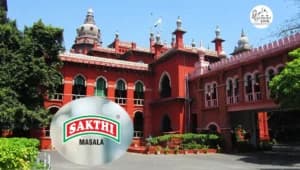On July 23, the Supreme Court reserved its judgment in the case concerning Tamil Nadu Health Minister Ma. Subramanian and his wife, who sought to quash the chargesheet filed against them in an alleged government land grabbing case during his tenure as Mayor of Chennai.
The case raises a crucial legal question:
“Is prior sanction required to prosecute a public servant for an offence allegedly committed during an earlier public office, even though the prosecution is initiated after they have assumed a different office?”
A Bench of Justice Sudhanshu Dhulia and Justice Aravind Kumar heard the special leave petition filed against the Madras High Court’s March 28 order that refused to quash the 2019 chargesheet. The charges were filed by the Organised Crime Unit of Crime Branch-CID based on a complaint by one S. Parthiban. He accused Subramanian and his wife of illegally grabbing two plots belonging to the Small Industries Development Corporation in Guindy, Chennai, using forged documents to construct a residence.
The Madras High Court had ordered that the trial against them should proceed.
Senior Advocate A. Sirajudeen, appearing for the complainant, argued:
“Subramanian was no longer a Mayor when the case was registered. Therefore, there is no requirement for sanction to prosecute him now, even if he currently holds the position of State Health Minister.”
On the other side, Senior Advocate Mukul Rohatgi, appearing for the Health Minister, and Senior Advocate P. Wilson, representing his wife, countered this view. Rohatgi maintained that since Subramanian currently holds a public office as a State Minister, a sanction is still necessary. He clarified that:
“A public servant can wear many hats. For example, one could have been an MLA in the past and now an MP. The question is: who gives the sanction? The authority to remove a person from their previous office—like Mayor—should be the one to grant sanction.”
He emphasized that:
“It only relates to the office in which the offence occurred. The authority must match that office, not the current one.”
Justice Dhulia pointed to precedent from R.S. Nayak v. A.R. Antulay (1984) and raised a query:
“Suppose, if a sanction is required, then what he [Rohatgi] says is correct or not?”
Read also: Supreme Court Seeks Independent Mechanism for BCI’s Law College Inspections
Later, he observed:
“This covers your case… Here it is clear. If someone has committed an offence while holding a public office and now holds a different one, sanction may not be needed. We are not saying this; the Supreme Court has already said it in the cited judgment.”
However, Rohatgi disagreed, stating that the precedent was based on the assumption that an MLA is not a public servant, making it possibly irrelevant to this case.
Justice Aravind Kumar further clarified:
“As a councillor or mayor, as he then was, he misused his office. But at the time of cognizance, he no longer held that office. So, no sanction is necessary. That is the sum and substance of this decision.”
Despite this, Rohatgi argued that taking such a view could conflict with Section 19 of the Prevention of Corruption Act.
The Supreme Court has reserved its verdict and will decide whether prosecution in such cases requires prior sanction.
Case Title: Ma. Subramanian vs The State of Tamil Nadu
Case No.: SLP(Crl) No. 007659/2025
Appearances:
- Senior Advocate Mukul Rohatgi for the Minister
- Senior Advocate A. Sirajudeen and Advocate on Record Rakesh Sharma R. for the complainant















